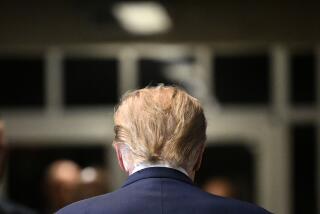Schwarzenegger’s wild ride ends quietly
Sometimes the page turns quietly, without the clang and confetti of a New Year’s celebration. So it appeared last week, as the display of power visibly shifted in Sacramento a month ahead of Jerry Brown’s formal assumption of the governorship from Arnold Schwarzenegger.
Brown announced last week that he would hold a budget summit on Wednesday and invited the Legislature, state and local officials and other interested parties. Schwarzenegger offered a somewhat wistful soliloquy about what being governor has meant to him, in personal terms that inadvertently underscored how different his ending has been from his beginning.
Monday will reflect a painful symmetry. The outgoing governor is expected to declare a fiscal emergency and call the newly elected Legislature into a special session to deal with the intractable budget deficit. On his first day in office he did the same thing, issuing a proclamation for a special session to deal with the state’s fiscal crisis. Governors change, but fiscal tumult endures.
----
Schwarzenegger came into office, of course, during the recall election of 2003, swamping a strange and eclectic field of first-time candidates and attention-seekers, his Hollywood tough-guy persona seen by voters as an antidote to a governor, Gray Davis, who they felt was flummoxed by the state’s problems. In another mordant bit of symmetry, Schwarzenegger leaves office about as popular as Davis was when he was kicked to the curb.
Whether that reflects the failures of both men or the fickleness of the electorate or something in the middle, it is what it is: In a September Field Poll, only 23% of Californians approved of Schwarzenegger’s handling of his job.
Schwarzenegger’s popularity over the years has catapulted from high to low, as if he was in the first car of a rollercoaster ride shared by 38 million people. He started strong and went even higher, by mid-2004 favored by two-thirds of Californians after mounting partisan bond measures that he promised would allow the state to cut up its credit cards forever. He slumped to a favorable rating in the low 30s in the fall of 2005 as he pushed a series of ballot measures that voters repudiated.
He rebuilt his popularity the next year, in time for reelection, and built on that momentum for several months. But as 2007 ended, a new slump began, the foundering economy helping thrust him ever lower. In July 2010, he tied Davis’ low point in the Field Poll — 22%, achieved weeks before the recall — and by September, as the race for his succession heightened, he had inched up an insignificant single point.
Those numbers represented the views of all Californians, the usual measuring stick for elected officials. The same undulating trajectory is evident when voters alone are considered, according to polls by the Public Policy Institute of California.
Of those who voted in November of 2005, in the disastrous ballot measure election, only 39% favored Schwarzenegger; by his reelection in 2006, that was up to 60%. In 2008, he had dropped to 42% job approval and last month he was down to 32%.
In a state where the Legislature is even less popular than the unpopular governor, it is tempting to think that Californians always deride their leaders, but that is not so. Apart from Davis, none of Schwarzenegger’s predecessors dropped as low as he has.
Democrat Pat Brown and Republican Pete Wilson bottomed out in the mid-30s to Schwarzenegger’s low 20s in the Field Poll. Ronald Reagan’s lowest job approval was 46% and his Republican colleague George Deukmejian’s lowest was a startling 53%. Even Jerry Brown, derided by the GOP this year as a failure in his first two terms, dropped only to 38% and at one point was popular with 69% of Californians.
----
Even if California’s choice in the recall evinced a certain desperation, Schwarzenegger tried from the beginning to command for California the buoyant success that had characterized his prior careers in movies and bodybuilding.
“This election was not about replacing one man; it was not about replacing one party,” he said in his first inaugural address in November 2003. “It was about changing the entire political climate of our state.... With the eyes of the world upon us, we did the dramatic. Now we must put the rancor of the past behind us and do the extraordinary.”
“I want people to know that my administration is not about politics,” he added later. “It is about saving California.”
Now that saving California is about to land in someone else’s lap, Schwarzenegger last week gave something of a closing statement at a Sacramento Press Club gala. He talked of the role’s personal effect, calling it “the most fulfilling and the most gratifying and rewarding job that I ever could have imagined.”
“The last seven years, of course, have certainly brought highs and lows, no two ways about it, a lot of highs and lows,” he said. And as he had in the first inaugural, he referred to his immigrant’s optimism.
“For an immigrant that has come over here with absolutely nothing and then to find yourself 42 years later in this position is absolutely extraordinary,” he said. “It really proves that this is the land of opportunity.”
For Schwarzenegger, his opportunity lasts 29 more days. The week was full of finality: accepting an award for environmental protection, dancing the hora outside the Capitol at his last menorah lighting as governor. The change about to come was evident in ways large — Brown’s announcement of the budget session — and small, via Twitter, a method of communicating that hadn’t even been invented when Schwarzenegger became governor.
Last week it was Brown who first tweeted to call attention to an article that said California’s woes had been exaggerated and that, rather than dragging down the rest of the country, it had been propping up the other 49 states. Schwarzenegger, still the governor, was left only to add: “Agree.”
Each Sunday, The Week examines implications of major stories. It is archived at latimes.com/theweek
More to Read
Get the L.A. Times Politics newsletter
Deeply reported insights into legislation, politics and policy from Sacramento, Washington and beyond. In your inbox three times per week.
You may occasionally receive promotional content from the Los Angeles Times.







